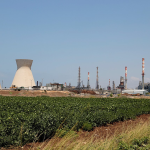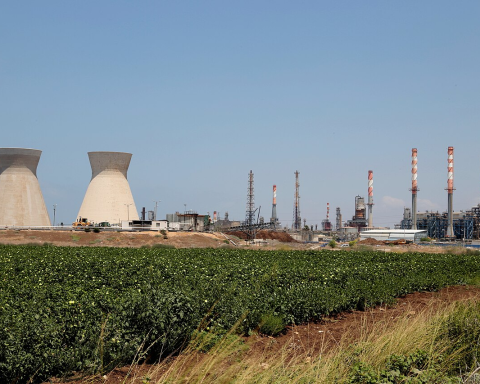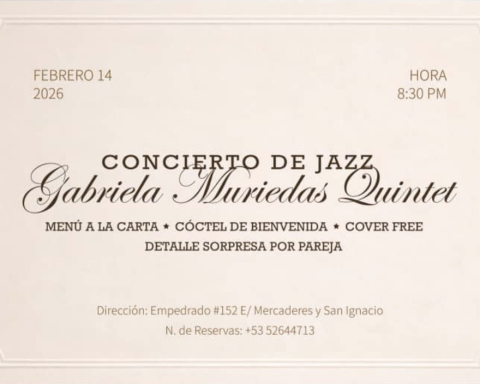-You, lonko, have been awarded, also recognized for your defense of the environment. He received the Goldman Prize, the so-called Green Nobel Prize, in 2019. While in preventive detention…
-Yes, indeed, it was 2019, when I was in prison in the Temuco prison for a fairly serious accusation, and of course, that is, everything has to do with the work that we have developed here, precisely in the Curacautín commune . Because when we talk about lof Radalko, in the commune of Curacautín, I insist, the extractivist companies are on our territory. At that time, the Piñera government used some leaders to be able to convince them and approve this project (two hydroelectric plants). Construction has not yet started, but I think we have to risk our lives to be able to defend and maintain the balance of nature.
-Then they continue in the fight to defend the territory to prevent, for example, that this project is carried out.
-Yes, everything is approved, in fact we add a new act of violence by a geothermal company, Adobera, which comes from abroad to drill our volcano (Tolhuaca), a sacred volcano. So, we here remain mobilized.
-What are you looking for with this project?
-The capitals are from European companies; the company is called Adobera, and what this means is that they intended to carry out or reactivate a geothermal project to extract or produce energy. An attempt had already been made, if I am not mistaken, from 2007 to 2012, and it failed, precisely on the Tolhuaca volcano itself. And now a new company is coming to be able to reactivate, but not in the same place, but a little further north, which means that, it is very serious, that is, there are six deep wells that they intended to drill more than 2 thousand meters from depth, so that’s a threat. That is where the waters are born, there where the araucaria is, where they want to practically exploit, cut down araucaria forests to be able to install their investments in that sector. So we’re up there opposing this. Now everything is covered in snow, but we are installed there to protect our sacred space.
-There are forests of araucarias…
-Yes, look, it is a mountain area where there are many monkey puzzle trees, and they are protected by certain environmental decrees. The connection or interconnection layout, that also means making a clearance of at least fifty meters wide, and in terms of kilometers what the layout means. Therefore, there is going to be a destruction of a native forest no less, and that obviously causes damage and also produces an imbalance in our spiritual life.
-I understand that you are defending the rivers of the sector as well.
-Up there, more than a river, it is where the waters are born, there is a lot of spring, which finally becomes a river, estuaries, and that source of that water, according to the depth of that perforation, means that that water almost 100% is going to go into those deep wells.
-In October 2021, as can be seen on the company’s website, the project was presented to the Municipal Council of Curacautín. Has it already been approved by the environmental authority?
-I think that this entire process of environmental evaluation was violated, that’s why I told you before, with great force, that the institutions of the State today have worked to generate violence in our space. In this case, Conadi, which supposedly represents or should represent the Mapuche population, signed a paper declaring that there are no nearby Mapuche communities that could be affected by this megaproject, therefore, they are authorized for this company to build, and that means that, if it does not exist, this company does not have the obligation to go through that Environmental Impact Service.
-In other words, haven’t they held an indigenous consultation?
-There is no consultation.
-How many communities are there in that sector that would be affected by this project?
-There are many communities, because precisely where this project was born it is like in a canyon, as it could be called geographically, and within that canyon there are many communities, but those of us who are installed above are four communities that today are defending that sector .
New Constitution
-In the Proposal for a new Constitution, the concept of Environmental Courts is incorporated, and it is also said that the original peoples will have ownership and resolution regarding the natural resources that are within their territory. And this is seen by those who integrate the Rejection option as an obstacle to development. What is your opinion about this?
-All the proposals that are there, that are being presented in this Constitution, I think they still have a lot of good intentions, but I insist on the issue of institutionality, it does not give me hope to let ourselves be carried away by it. There is the experience of what Conadi meant, it was a demand from the people in the midst of the dictatorship, where the formation of this corporation was agreed to resolve the indigenous conflict and the demand for land in general. However, in recent times, it has been an obstacle to resolving the conflict. In that sense, I believe that our expectation that everything will turn out well today, through this new Constitution, in the face of the proposal to create institutions, I believe that it would be a mistake to expect that, to trust in this. I’m not saying it’s wrong, I think it’s necessary because it can facilitate or improve the process of our recovery or our defense, or our control that we want to do in our territory, but for us the most important thing is the re-education of our generation within of our communities.
Some of this is what was done a few weekends ago, when the lonko Alberto Curamil led the “Environmental and Intercultural Dialogue” in the Municipal Library of the Curacautín commune. Day in which leaders of lof Radalko and lof Pidenko delivered information to the community about their position regarding the geothermal project in the Tolhuaca volcano. To date, four Mapuche communities in the sector have occupied the land on which the works of the Adobera company are to be installed.
-What do you think of the proposal presented today for this plebiscite, of this new Constitution?
-Look, this new proposal has not caused me much surprise or impact. Although it is true, it is an instance that is very important, very interesting to see in recent times. I think that as a Mapuche nation we have a very different existence, a very different vision of how to reorganize or rebuild ourselves in our space, and when I say rebuild, it has to do with an aggression that we suffer, we live by the same State that today has a different proposal maybe.
-There is criticism from those who resist this proposal, even saying that it is a kind of positive discrimination against indigenous peoples, what do you think of that vision?
-I believe that there is an important fact that is taking place within this process at a national level like Chile, which has to do with the participation of many sectors that, at some point, each of these actors were also in the streets protesting against a military regime. We see, for example, from the Mapuche world Adolfo Millabur, a man with a lot of experience, who is working there to be able to raise perhaps certain problems, or certain realities that we have suffered, lived in the Wallmapu. At the same time, there are also other people like Elisa Loncon, they are important people I think, and they know how to write, they know what they are saying and I have no doubt that yes, they too will make their contributions to what conservation means or the defense of our natural resources in Wallmapu. At the same time, we can also mention a newer generation as a non-Mapuche person in this case, Manuela Royo herself, who lived through an experience within our territory, within the processes of recovery, repression, torture and imprisonment that she had to live personally, I think she is also aware and we trust in the proposal that they can put forward within this new Constitution; the same with Rosa Catrileo, a woman also with a law degree, knowing the legal system; Natividad Llanquileo, of course, are people who have experience and who have lived, and in that sense I think I cannot say that I reject this instance or refuse to listen to this instance that is being lived. And we also trust the people that at some point the protest, I say, will also continue in the street, because despite what I have mentioned, the proposal did not turn out as we would like, especially for the Mapuche. ; when I say that we have a very different vision and it is not possible to answer our approach. However, this process is respected, I believe that what is being carried out is very good.
-But are you going to approve or reject, lonko?
-Look, I think that my call, in honor of all the compañeros, compañeras, who demonstrated in different communes, in different regions, in the streets, in the squares, when I mention the detainees, the tortured, the mutilated, true, in honor of them I do go to Approval.


















